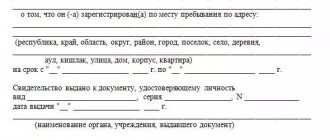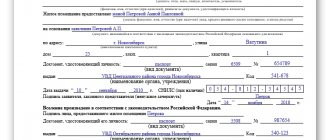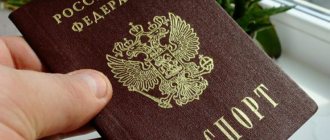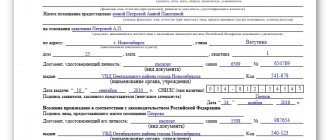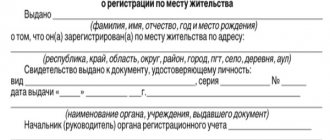Every citizen of Russia has heard that registration and residence permit are required to live in the country. To whom? For what? In which cases? Almost no one thinks about this. Most of us are accustomed to the fact that we have a residence permit by default, and registration is most likely needed by our foreign friends and colleagues who come to the country for tourist or business purposes. Let's figure out what the difference is between the concepts familiar to us from childhood. What lies behind them and how to use them so as not to unknowingly violate the law of the Russian Federation?
Types of citizen registration
The main difference in residence permit and registration is that in the first case a person does not have the right to move freely around the country, but in the second case the citizen is completely free to move.
There are two types of registration:
- Permanent (at place of residence). It is stamped in the passport, valid for an indefinite period, and carried out at the place of permanent residence.
- Temporary (at the place of stay). The person is given a certificate; the registration itself is valid for no more than 5 years.
A temporary option is necessary to register a person at his place of stay, where he will be staying for a short time. At the same time, permanent registration is not cancelled.
The difference between registration and temporary registration is the validity period. Registration is a permanent registration at the place of residence, which is carried out by the owners of the living space and is marked in the passport.
A little history
The institution of registration on the territory of our country appeared in Soviet times. It was closely connected with the internal passport system and was used to control the movement of citizens both within the RSFSR and the USSR as a whole.
Until 1974, not all citizens of the Soviet Union had passports and registration. Peasants, for example, were deprived of such a privilege, but at the legislative level they were given the right to free movement on the basis of documents issued by village councils.
Modern registration at the place of residence and Soviet registration are almost the same thing. On a legal level. In practice, registration in the USSR has always been one of the most necessary and honorable things (after a passport), giving the right to a good job, living space and public respect. To obtain a residence permit in large Russian cities (Moscow and Leningrad), it was necessary to work for several years in jobs that were unattractive for metropolitan residents. Nowadays a residence permit can be “purchased” along with an apartment, and its presence provides more domestic rather than social comfort.
Features of permanent registration
Permanent registration gives the right to reside at a specific address, which is noted in the citizen’s passport.
A person with such a stamp at a certain address has the following advantages:
- a citizen registered in a given territory can become a participant in the privatization process if the housing is municipal;
- has the right to express his opinion regarding the registration of other persons in this living space;
- the opportunity to provide permanent residence registration for friends and relatives at this address.
If a person is permanently registered in a city of federal significance, then he can stay in the corresponding region without temporary registration for longer than 90 days.
What does registration give to the state?
Accounting for population movements at the state level is needed for:
- the needs of state and regional management of territorial entities;
- ensuring state security;
- accounting for the movement of labor resources;
- logistics of transport flows;
- budget planning and other needs.
Registration in Russia is handled by the Federal Migration Service through its territorial offices.
Design rules
To obtain permanent registration, you must go to the passport office at your new place of residence with a full package of documents. You must first check out from your previous place of residence. It is acceptable for the passport office to issue a visa from your previous place of residence. If employees of this institution refuse to do this on their own, then their actions are illegal.
At the passport office you need to fill out an application on form No. 6. They can register in 1 day if the citizen was discharged from his previous place of residence in advance. If not, the period may take up to two weeks.
What is the difference
The registration process is carried out at the local FMS office. To do this, a certain group of citizens must contact the authority with a corresponding application. Registration after receiving a residence permit must be carried out within 7 working days from the date of issue of the relevant special permit.
It is worth noting that failure to comply with these deadlines may result in administrative penalties. In some cases, if a person has foreign citizenship, he may be deported from the country.
As for registering a marriage with a residence permit, it implies registration at the place of actual residence of the spouse. The procedure in this case is carried out at the FMS office of a specific region. To carry out such registration, you must first deregister from your previous place.
Permanent registration of citizens of foreign states must be carried out by authorized representatives of the Federal Migration Service immediately on the day the person submits the relevant application. In this case, the state fee is 350 rubles.
Temporary registration with a residence permit is ideal for those citizens who:
- arrived on the territory of the Russian Federation for a temporary stay on the territory of health centers for the purpose of treatment;
- arrived in the region to carry out seasonal work on a rotational basis;
- are serving administrative punishment.
The current migration legislation excludes residence without registration, and this is due to the fact that a person without registration will not be able to undergo migration registration, use the services of the healthcare system or get a job legally
Required Documentation
In addition to the application, you must submit the following documents:
- passport of a citizen of the Russian Federation;
- birth certificate for children under 14 years of age;
- a document confirming ownership of the property;
- contract basis: inheritance document, purchase and sale agreement, transfer as a gift;
- If you checked out in advance, you will need a departure slip.
The passport office employee must check the presence of all necessary documents and pick up the passport to make the appropriate entry.
Historical reference
In Russia, citizens became familiar with the term “registration” back in Soviet times. It was during this period that the institution of registration appeared in the country. It was associated with the control of population movement across the territory of the USSR and the RSFSR. At the same time, active issuance of passports began.
In 1974, the majority of the population already had both identity cards and registration. Previously, this term served as a guarantor of good living and working conditions and indicated a special position in society. They were proud of their registration, many sought to obtain it. In order to acquire such a document, it was necessary to work for several years in unattractive and even menial jobs. Therefore, the mentioned term meant a lot.
Basic provisions of temporary registration
Temporary registration is carried out at the place of stay and must be recorded no later than 3 months after the move. Otherwise, it is an administrative offense with a fine.
Advantages and disadvantages
Temporary recording has a number of advantages:
- quickly processed;
- you can officially get a job;
- You can reduce the cost of utility bills at your place of permanent residence.
But temporary registration also has a number of disadvantages:
- it is impossible to obtain an insurance policy if a citizen is registered but not employed;
- You cannot get a mortgage loan;
- there is no access to the full list of government services.
If there is a certificate, a citizen has the opportunity to register a minor there without the consent of the owners.
How to apply
For registration, you must provide the following documents to the passport office:
- application form;
- copy of the passport;
- arrival slip;
- owner's consent to registration;
- a document confirming the owner's rights to this premises.
After checking all the documents, the applicant will be issued a certificate of temporary registration. This requires a maximum of 3 days.
Rights and obligations
Newly registered citizens are required to pay utility bills and maintain the property of the owners in order.
A citizen receives the following rights:
- you can complete all the documentation that a person needs at the moment;
- allowed to issue loans and credits;
- receiving social benefits;
- you can enroll your children in school and kindergarten;
- You can take part in the process of privatization of premises on the territory of which the citizen is registered.
Banks do not really trust citizens with temporary registration, so getting a consumer loan is theoretically possible, but quite difficult.
Validity
For foreign citizens, the period of temporary registration should be no more than 1 year. For citizens of the Russian Federation – maximum 5 years.
Differences by type of housing
To register in:
- Privatized housing without property rights will require the consent of the owner (co-owners). Minor children are automatically registered with their parents. At the same time, the owner has the right to register as many people as he wants in his living space; housing standards are not taken into account. All owners are required to come to the registration authority to participate in the registration procedure. If there are several of them, then you can issue a power of attorney for one and attach copies of the passports of the co-owners.
- In municipal housing, you will need to obtain the consent of the owner (Housing Fund or municipality) and obtain permission from everyone registered in the premises. But only close relatives of the main tenant can register permanently, then each of them will need to be included in the social tenancy agreement, which he draws up with the owner when renting a home. In this case, the FMS does not require permission from the owner; registration is completed according to a simplified procedure. If housing standards are not observed, then no one will give permission for the registration of a new tenant.
- A room in a communal apartment will require not only permission from the owner, if the living space has not been privatized by the main tenant of the room, but also consent from all neighbors. A communal apartment refers to a special type of housing, where some part of the living space is used by registered citizens personally, and the other part is shared (toilet, bathroom, kitchen, corridor). When each new tenant moves in, the interests of the residents are infringed, so they must agree with his move-in. If the room has already been privatized by the tenant and he has become the owner, then he can register someone on his territory without permission.
- It is easiest to register in real estate that belongs to the registered person as a property owner. All you need is a title document, an application and a passport.
How to change temporary registration to permanent
To change temporary registration to permanent registration in the same housing, it is necessary that the applicant has rights to this territory.
If, during the privatization process, the temporarily registered person became one of the owners of the apartment, then after receiving the relevant document in hand, you must contact the passport office, write an application, provide all the papers and wait for the coveted stamp to be placed in the passport.
Since the same address cannot have both registrations at the same time, as soon as the applicant is issued a passport with a registration stamp, his certificate of non-permanent registration becomes invalid.
According to the constitution, citizens of the Russian Federation have the right to move freely throughout the country. But at the same time, it is important that they comply with the law and undergo the registration procedure at the place of stay where they have been staying for more than 3 months. Otherwise, a fine is provided for individuals and legal entities. Owners of housing where an unregistered resident lives may also suffer. To obtain a temporary or permanent residence permit, you must contact the passport office with documents confirming the right to register in this territory.
Difference between place of stay and actual residence
The place of stay, as mentioned above, is a residential premises where a person temporarily lives for a period established by law. At the same time, the law clearly states which institutions are considered temporary locations: sanatoriums, rest homes, bases, campsites, and so on.
Actual residence indicates the place in which a person actually lives and long-term. Please note that the terms “place of residence” and “actual residence” are not identical. The address of residence and the address of actual residence may not coincide: a person, for example, is officially registered in one city, but actually lives in another.
Find out more.
About eviction
Today in Russia it is not so difficult to explain the difference between registration and registration. The main thing is to carefully study the current legislation.
It is easier to evict a citizen from an apartment with temporary registration than it is to evict a citizen registered in housing on a permanent basis. The legislation of the Russian Federation currently prohibits depriving the population of the only roof over their heads. And if the registered person is also the owner of the apartment, there can be no talk of eviction. Only in exceptional cases will it be possible to bring the idea to life.
If there is a temporary registration, residents must leave the territory upon expiration of the issued document. Or the property owner can evict citizens through legal proceedings.
